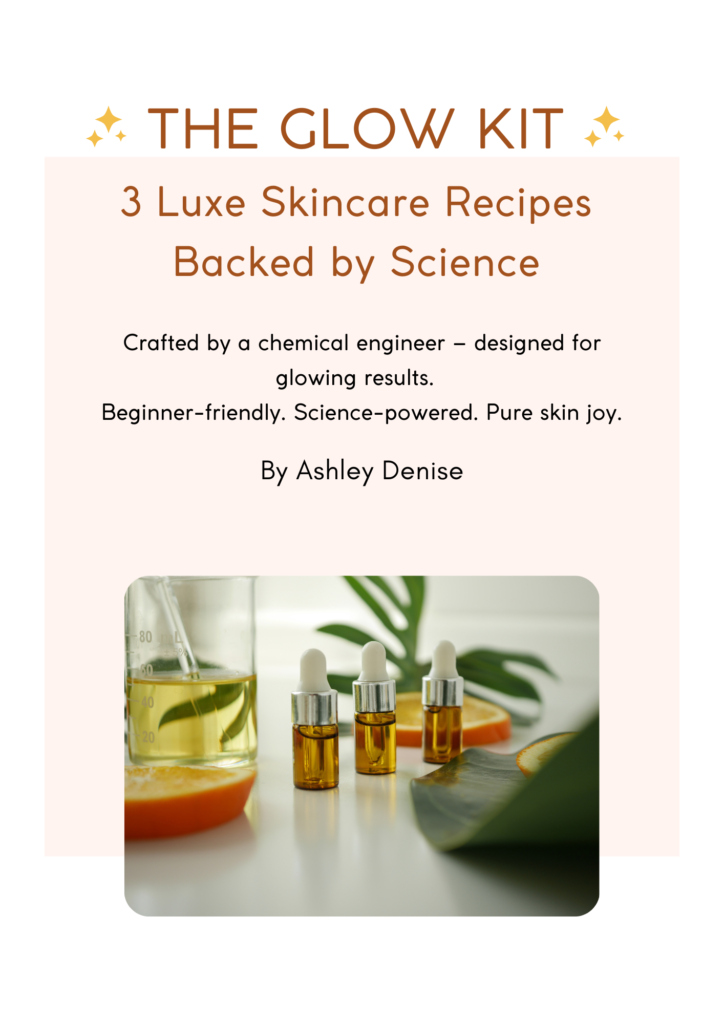In the ever-growing indie skincare world, your first steps matter—a lot. If you’re dreaming of launching your own skincare line, you’re probably already juggling questions: Should I formulate a moisturizer? A toner? A serum with ten actives and a mysterious name? While there are many ways to begin, one of the smartest, most scalable, and beginner-friendly starting points is with oil-based skincare products.
Why? Because they’re the golden middle ground where science, simplicity, and marketability meet. Whether you’re a kitchen-formulator mixing in your pajamas (respect!) or already planning to scale your production, starting with oil-based products allows you to keep things low-risk while still creating luxurious, effective, and professional skincare formulas.
Let’s break it down scientifically and strategically—because formulating isn’t just chemistry; it’s also business.
What Are Oil-Based Skincare Products?
Oil-based skincare products are classified as anhydrous, meaning they contain no water—zilch. Instead of formulating with aqueous ingredients like hydrosols, aloe juice, or distilled water, you’re working 100% in the lipid phase. This gives you a highly stable, long-lasting product that doesn’t require complex preservatives or microbiological testing from day one.
These formulas are typically made with:
- Plant oils (like jojoba, marula, rosehip, and sea buckthorn) that mimic the skin’s natural lipid barrier
- Botanical extracts such as calendula or chamomile infused in carrier oils
- Oil-soluble active ingredients, including antioxidants like CoQ10 and squalane, or gentle retinol alternatives like bakuchiol
- Essential oils (optional—and when used, always in well-calculated, safe dermal limits)
- Silicone alternatives and esters, which can enhance skin feel and absorption
Oil-based skincare products don’t just sit in one product category either. They can take many forms, including:
- Facial oils
- Body oils
- Cleansing oils
- Lip oils
- Oil serums
- Massage oils
And the kicker? Because there’s no water, you don’t need preservatives for oil-based skincare products. This is huge when you’re just getting started—no challenge of pH balancing, no fear of bacterial contamination, and no worries about using the right preservative system. You’re working in a microbiologically safer zone, especially if you’re producing small batches from home or shared labs.
Let’s pause for a moment here. Think of how much mental bandwidth this frees up—no need to obsess over whether your preservative is broad-spectrum or if your formula supports it. Instead, you get to focus on choosing high-quality oils, understanding skin compatibility, and creating a sensorial product experience.
Why Start with Oil-Based Products?
Starting a skincare brand is exciting, but let’s be honest — it can also feel like stepping into a chemistry lab with no manual. That’s why oil-based products are such a smart starting point. They simplify the process, reduce regulatory stress, and still allow you to create luxurious, effective skincare. Let’s dive into why this product category is a beginner formulator’s best friend.
1. No Preservatives Needed
One of the most underrated perks of oil-based (anhydrous) formulations is that they don’t require preservatives. Why? Because microbes — bacteria, mold, yeast — need water to grow. Without water, there’s no party for them to crash.
This simplifies formulation dramatically:
- You don’t need to worry about preservative efficacy testing.
- You skip compatibility checks (some preservatives clash with actives or packaging).
- You avoid regulatory restrictions and “preservative-free” marketing headaches.
Plus, many conscious consumers are on the lookout for “minimal” or “clean-label” skincare. Being able to claim no preservatives needed isn’t just scientifically accurate — it’s also a marketable advantage.
⚠️ Of course, you’ll still need to protect against oxidation (more on that below), but that’s a much easier beast to tame.
2. Longer Shelf Life (With the Right Oils)
Most oil-based skincare products have a longer shelf life — but only if formulated correctly.
The real MVPs here are stable plant oils (like jojoba, squalane, or fractionated coconut oil) and antioxidants such as:
- Tocopherol (vitamin E)
- Rosemary extract
- Coenzyme Q10
- Astaxanthin (yes, it’s red — and yes, it’s a powerhouse)
When paired with dark glass packaging and stored away from heat and light, your facial oil can easily last 12 to 24 months — making it perfect for small indie brands who can’t afford rapid inventory turnover.
And let’s not forget: fewer returns, fewer complaints = happier customers + less waste.
3. Simple Equipment, Low Investment
Forget the lab coat and thousand-dollar homogenizer. For most oil-based skincare products, your equipment list looks like this:
- A digital scale (preferably accurate to 0.01g)
- A couple of heat-resistant glass beakers
- Pipettes or glass droppers
- A clean spoon or spatula
- Sanitized jars or dropper bottles
That’s it.
No need for pH adjustment, no heat-sensitive emulsions to freak out over, and no need to chase phase stability with expensive emulsifier blends. You can test, tweak, and reformulate easily — right from your home studio or kitchen table.
💡 Want to scale later? You’ll already have a base formula and packaging setup that’s easy to duplicate.
4. Beginner-Friendly Formulation (a.k.a. Less to Screw Up)
Look, emulsions are gorgeous — but they’re also high maintenance. You need:
- pH balancing (and pH meters)
- Preservatives (and preservative testing)
- Emulsifiers (and a backup when your emulsion breaks)
- Stability testing (because nobody wants separation)
With oil-based products?
- No pH testing necessary
- No phase separation when you choose compatible oils
- Minimal risk of instability or irritation
That’s a huge win for new formulators — especially if your background isn’t chemistry. It’s a gentler learning curve, and the barrier to entry is much lower.
5. Clean, Minimalist Appeal
Today’s skincare buyers are ingredient-savvy. They want transparency, minimalism, and intentional formulation. A facial oil with just 5–7 recognizable ingredients? It stands out in a world of 20+ ingredient creams full of jargon.
Oil-based skincare products allow you to craft formulas that feel artisanal — without sacrificing function.
They also photograph beautifully and are ideal for platforms like:
- Etsy
- Instagram shops
- Indie beauty fairs
- Your very own branded website (your vision, your vibe, live and glowing ✨)
6. Supports Branding & Storytelling
Want to build a strong brand story from day one? Oil-based products give you the perfect canvas.
Let’s say you use:
- Marula oil ethically sourced from Namibia 🌍
- Rosehip CO2 extract harvested in the Andes 🌹
- Sugarcane-derived squalane grown sustainably in Brazil
Now you’re not just “selling oil.” You’re creating a journey, a ritual, a philosophy — and your packaging, copy, and visuals can reflect that.
Plus, botanical ingredients connect emotionally with customers. They’re romantic, earthy, powerful — and easy to weave into brand storytelling.
7. Easy to Scale (Yes, Even from Your Kitchen)
Once your facial oil formula is tested and loved, scaling up is far easier than with water-based products. You won’t have to worry about:
- Heat-sensitive emulsions breaking down
- pH drift during bulk production
- Complex filling equipment (gravity fillers work great!)
You can go from test batch → production → fulfillment with far fewer logistics. And you won’t need to invest in a huge lab setup. Many successful brands have grown steadily from home — one amber bottle at a time.
Whether you’re crafting for a group of 10 close friends or building a brand that reaches thousands, this product type won’t let you down. It makes sense scientifically, it’s profitable as a business model, and it’s powerful from a marketing perspective.
What About Product Variety?
One of the biggest myths around oil-based skincare brands is that you’ll be limited in product options. Nope — not even close. In fact, oil-based products can form the backbone of a full, cohesive, and luxurious product line. Here’s just a taste of what you can create:
Face Care
- Antioxidant-rich facial oils: Featuring oils like rosehip, cacay, or raspberry seed.
- Dry oil serums for oily/acne-prone skin: Lightweight esters and anti-inflammatory actives.
- Oil-based cleansers: Gentle, effective makeup removers and first cleansers in double cleansing routines.
Body Care
- Luminizing body oils: With shimmer pigments and nourishing oils.
- Firming massage oils: Infused with caffeine, essential oils, or warming botanicals.
- After-sun repair oils: With calming ingredients like calendula and tamanu oil.
Lip & Specialty Oils
- Lip treatment oils: Glossy finishes, rich in ceramides and fatty acids.
- Brow & lash conditioning oils: Safe, botanical blends that promote hair health.
- Cuticle & nail oils: Fast-absorbing and super popular for mani-care.
With the right formulation know-how, you can build an entire line — and it’ll feel cohesive, elevated, and intentional. Oil-only doesn’t mean boring. It means focused, clean, and versatile.
Realistic Revenue Potential
Let’s talk money. Oil-based products — especially facial oils and serums — perform incredibly well on e-commerce platforms. Why?
- High-perceived value
- Low production cost
- Excellent value-per-use
- Minimal packaging needs
- Profit margin: 🔥
With the right branding, storytelling, and social proof, customers expect to pay a premium for facial oils. And because oil-based products are stable and long-lasting, there’s minimal risk of spoilage or returns.
How Our Facial Oil eBook Can Help
If you’re serious about building a skincare brand rooted in oil-based products, we’ve got you covered. Our “Facial Oil Serum Formulation Guide” is tailor-made for beginner formulators and emerging brand founders.
What’s inside?
- The science behind carrier oils, esters, and oil-soluble actives
- How to match oils with skin types and absorption rates
- Strategies for layering oils for maximum effect
- Ingredient selection based on gua sha, oily skin, mature skin use cases
- Phototoxicity, comedogenicity, dermal limits — all broken down simply
- Step-by-step breakdown of how to build and test your own formula
You’ll also get:
- 15 professionally structured, fully customizable recipes
- Ingredient and supplier lists
- Pro-level tips for creating standout oil serums — from formulation to final touches
- 163 pages of smart, human-friendly info — no fluff, no filler
👉 Explore the Facial Oil Serum eBook now and start your skincare line the smart way.
Final Thoughts
Starting your skincare brand with oil-based products isn’t just the easy route — it’s the strategic one. You get:
- Simpler formulation workflows
- Lower startup costs
- Faster product development
- More time for brand building, storytelling, and connection
You’ll gain confidence as a formulator, build trust with your audience, and carve out a brand identity that’s clean, effective, and modern.
Whether you’re formulating for a friend group or launching to thousands — this category gives you power and flexibility.
The best part? You can start today.
Ready to Launch Smarter?
Grab your free PDF guide and start formulating your first luxe oil-based skincare products today — fast, safe, beginner-friendly.

✨ The Glow Kit – Your Free Starter Pack
Curious what beginner-safe skincare actually looks like? 👇
Created by a chemical engineer, this kit includes:
- 🌿 Botanical Luxury Body Oil – Lightweight & nourishing
- 🍯 Brown Sugar Glow Scrub – Exfoliating & energizing
- 💋 Botanical Lip Butter Balm – Smooth & shine
These are real, beginner-safe formulas — backed by science and ready to test in your own studio.
Start your skincare brand the smart way.
🤔 Still Have Questions?
If you’ve got questions, I’ve got answers — and I personally read every message.
Just drop your thoughts in the form below or email me directly at [email protected].
I’m here to help — really.

